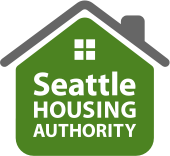SEATTLE—July 10, 2008—Seattle Housing Authority and the City of Seattle are partnering to provide summer job opportunities for ten young people at Yesler Terrace. The youths will learn about architecture, urban planning and community development while helping to create a video documentary chronicling the histories of people who have lived at Yesler Terrace.
The program, called Yesler 2014, is being created and coordinated by Edward B. Hill, left, a University of Washington graduate student and Yesler Terrace redevelopment intern.
According to Hill, "The program is a way to expose the youth of Yesler Terrace and surrounding neighborhoods to the urban planning and design fields, and a way to integrate different elements—employment, civic engagement, sense of place, knowledge of the redevelopment process and career development—to provide a sense of community stability that can carry through the upcoming redevelopment."
The youth will work six hours a day, four days a week, participating in a combination of training activities and planning work that puts what they learn in the classroom to use. They will conduct community surveys, develop their own proposals, and learn what is involved in being an architect or urban planner. Their "classroom" will include Yesler Terrace itself, and they will visit local architectural firms, design firms and city planning agencies.
Hill has a 15-year history of working with middle school and high school students in Seattle. He hopes that the program will inspire some participants to pursue careers in planning, design or architecture. "Very few minorities participate in this career path," said Hill, "even though they are being sought by employers."
"I am also hoping that these young people will better understand what's happening with the Yesler Terrace redevelopment," he said. "Then they will be able to answer questions for their neighbors and help others to get meaningfully involved."
The program began July 1 and will last for eight weeks. "We'll be doing a documentary about the history of Yesler Terrace," Hill said. "Elders who have been there a long time are welcome to tell their stories. People who have moved out of Yesler Terrace and become prominent figures in the community will also be interviewed." The idea behind the documentary is to gain an understanding of the community's history. The completed documentary will be submitted to the City of Seattle's Department of Neighborhoods and the Northwest African-American Museum for their archives.
Program participants welcome inquiries from long-time residents who are willing to be interviewed. Those who have lived in Yesler Terrace for at least 20 years or were raised there and have moved away can e-mail Hill at ehill@seattlehousing.org or contact him by phone at 206-615-3485 to discuss setting up an interview.
